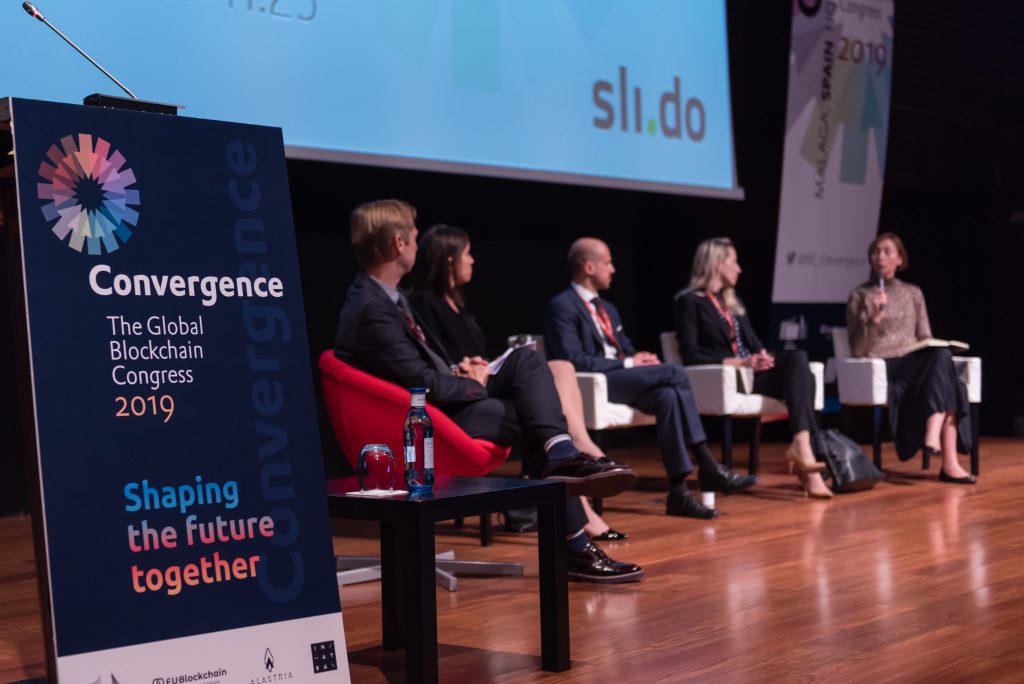Madrid, 11 November 2020. One year ago, Convergence, The Global Blockchain Congress 2019, successfully celebrated its first edition with nearly 1,400 attendees from more than 50 different countries. A total of 230 speakers, including regulators, policymakers, industry influencers and members of the blockchain community, enabled Convergence 2019 to meet its expansion and outreach goals.
The Congress, co-organised by the European Commission, the EU Blockchain Observatory-Forum, INATBA and Alastria, featured a programme of activities covering more than 80 keynotes, panels, roundtables and meetings focusing on the possibilities that blockchain technology offers to both companies and societies.
Over three days, the event highlighted the importance of blockchain, not only as a tool at the service of business, but also as an accelerator of solutions to today’s major global challenges. For example, the role of this technology is key to putting an end to poverty and hunger, facilitating access to health services, improving infrastructures, reducing inequalities, combating climate change, protecting marine ecosystems and promoting alliances between different actors to improve people’s lives.
Global Blockchain Challenge
Among the programme’s activities, the “Global Blockchain Challenge“, in which 22 teams participated, with a total of 66 members from 9 different countries, stands out. The initiative aimed to design blockchain-based solutions addressing the challenges around the 17 Sustainable Development Goals (SDGs) of the United Nations. The winners were Claudia Condulet (Ab InBev), Gilda Gil Chávez (Ligno Pure) and Rahul Bobba (NEC Labs Europe GmbH), for the project “Beer grains protecting coral reefs” (category “Best blockchain-based start-up”); the team of María Salgado Iturrino, Alejandro Gómez de la Cruz Alcañiz and David Pascual Portela, representing the Universidad Politécnica de Madrid, IECISA and ICOFounding, respectively, for the project “Improving infrastructures with citizen participation” (category “Best blockchain-based scaling”); and, Daniel Santos, Vicente Ortiz, Simone Brighina (from the “Motoblockchain” S. L), Enrique Serrano, from Novoshore and José Luis Molina, lawyer at Vicente Ortiz Abogados, for the project “Gamification to boost vaccination rates” (category “Best social impact initiative”).
A powerful agenda
The three-day Congress featured Latvian President Egils Levits reflecting on how technology and law can, with an ethical vision, go hand in hand; Turing Award winner Silvio Micali exploring the value of decentralisation; the Libra Association and Facebook, discussing stable coins and their relationship with financial regulators in the EU and Japan; the European Data Protection Board, addressing the relationship between blockchain and GRDP, the technological convergence of blockchain with AI, Big Data and the IoT or the need for standardisation for blockchain adoption.
In addition, the experiences of blockchain in other regions such as Latin America, Asia, Africa, Europe (with the large EBSI project), the United States and Canada were also shared, as well as the impact of this technology on governance, the supply chain, sustainability and the fight against climate change or social good, among other points.
Also present at the closing ceremony were Carlos San Basilio, Secretary General of the Spanish Treasury and International Finance; Nikhil Seth, Under-Secretary General of the United Nations (UN) and Executive Director of the UN Institute for Training and Research; Bitange Ndemo, from the University of Nairobi; and the Mayor of Malaga, Francisco de la Torre.
The Ministry of Economy, Knowledge, Business and University of the Andalusian Regional Government, Malaga City Council and Extenda were the main institutional partners of this edition, which was also sponsored by Everis / NTT DATA, Grant Thornton, Oracle, IOTA, Consensys, Unicaja, Caixabank, Santander and IECISA.
“The response received from attendees, collaborators and organisers was highly positive, highlighting the scope and depth of the agenda, the quality and geographical and gender diversity of the speakers and the spaces generated for networking and for the demonstration of blockchain-based solutions,” recalled Montse Guardia, CEO of Alastria.
Convergence 2019 was not only the stage for international collaboration between representatives from various industries, governments and companies, but also boosted the motivation to continue imparting knowledge about blockchain technology.
